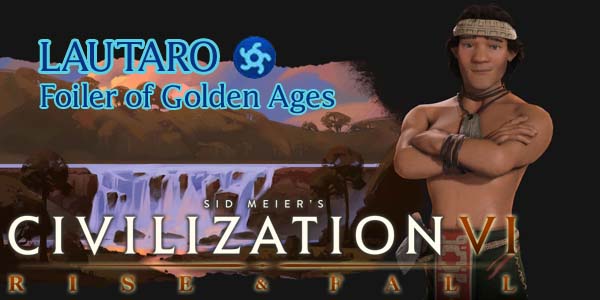
Civilization VI's first expansion, Rise & Fall released earlier this year, and it introduced a few leaders and civilizations that are making their first appearance in the franchise. I hope to be able to write strategies for every one of the expansion civs and leaders, but I'm going to start with the ones that are new to the franchise, and the ones that most utilize the expansion's new features (Era Score, governors, loyalty, and so on). This month, I will be tackling the Mapuche, lead by Lautaro.
The peoples known as the Mapuche are a collection of societies indigenous to southern Chile and Argentina who are linked by social, spiritual, economic, and linguistic heritage. Archaeological evidence shows their culture has existed since around 600 or 500 BC, and their textiles have been traded throughout South America for centuries. Though mostly independent, the various tribes would unite together during times of war (such as against the Inca and Spanish) and elect a "toqui" (meaning "axe-bearer") to act as a military and domestic leader.

One such toqui was Lautaro "Swift Hawk". He was elected toqui while still less than 20 years old, after escaping from the personal captivity of the Spanish general Pedro de Valdivia. He lead numerous successful raids (called "Malón") against the Spanish, eventually capturing Fort Tucapel in December and killing his former captor, de Valdivia, during the Spanish counterattack in December 1553. The Mapuche, under Lautaro's command, may have been able to further expel the Spanish if not for a typhus outbreak and famine that prevented further raids. He was killed four years later in a Spanish ambush, but the Mapuche would continue to resist the Spanish for over a century after Lautaro's death. Lautaro is revered by Chileans (Mapuche and non-Mapuche alike) for his courageous leadership against the Spanish who sought to enslave them, and is even depicted as an almost heroic figure in the Spanish epic poem La Araucana.
Lautaro and the Mapuche can be a potent military force in Civilization VI: Rise & Fall, especially against rival civilizations that ascend to golden ages, or who fall into dark ages.
[More]
a95ca795-d055-4cea-94db-0c1f2aeff1de|0|.0
Tags:Sid Meier's Civilization, Civilization VI, Civilization VI: Rise and Fall, Mapuche, Lautaro, Toqui, Swift Hawk, Spirit of Tucapel, Malon Raider, Chemamull, loyalty, golden age, dark age, culture, appeal, tourism, cavalry, light cavalry, pillage, Chile, unique improvement, unique mounted unit
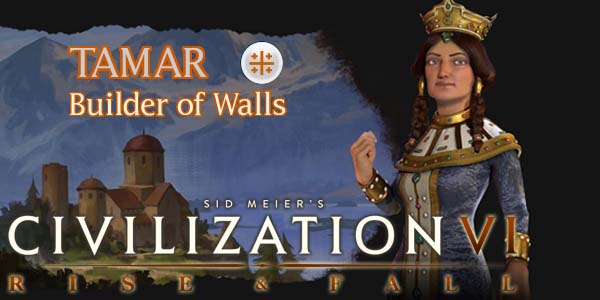
Civilization VI's first expansion, Rise & Fall released a couple months ago, and it introduced a few leaders and civilizations that are making their first appearance in the franchise. I hope to be able to write strategies for every one of the expansion civs and leaders, but I'm going to start with the ones that are new to the franchise, and the ones that most utilize the expansion's new features (Era Score, governors, loyalty, and so on). The first civilization that I will tackle will be the Georgian civilization, lead by Queen Tamar.
The feuding Georgian kingdoms in the Caucusus were first united under Bagrat III between 1008 and 1010 AD, after he tricked his cousins (the heads of feuding houses) into a false reconciliatory meeting, only to throw them into prison and ensure that his son would become heir to the kingdom. A few years later, however, that son would become a prisoner of the Byzantines as part of a peace deal after Bagrat's failed attempt to reclaim the ancestral city of Tao from the Eastern Roman Empire.

The Georgian empire reached its height under the rules of King David IV and Queen Tamar in the 12th and 13th centuries. These monarchs took advantage of the decline in Byzantine power and filled the power vacuum by claiming lands lost by the Byzantines. During this time, art and literature flourished, and Georgia developed its own architectural styles. Ecclesiastic art was dominant, but this period also saw some of the first major secular works of art and literature. This period would eventually become known as the Georgian Renaissance (or "Eastern Renaissance"). The renaissance continued under Tamar's rule, who proved adept at statecraft. She mediated internal tensions within her kingdom, and even thwarted a coup by her Russian husband, all the while protecting her kingdom from Turkish invasions and claiming Muslim lands to the east and south.
The Kingdom of Georgia's golden age would eventually come to an end at the hands of invading Mongols in the 13th century. The kingdom would be fractured, and the ensuing Black Death would ensure that Georgia would never again reach its former glory.
DISCLAIMER:
Civilization VI is still very early in its life-cycle (particularly the Rise & Fall expansion. Strategies for the game (and for specific leaders and civs) may change as Firaxis applies balance patches, introduces new features, or expands the game through further DLC or expansion packs, or as the Civ community discovers new strategies or exploits. As such, the following strategy guide may change from time to time. I will try to keep it up-to-date, and will make notations whenever changes are made. I'll also post links in the official 2K forums and CivFanatics, where I'll also report any changes made. If possible and practical, I will try to retain the original content of the strategy for posterity.
I welcome any feedback or suggestions that readers wish to offer. Feel free to post on the linked forums, or by posting a comment at the bottom of the page.
This guide is up to date as of the March 2018 patch (ver. 1.0.0.229)
In Civilization VI: Rise & Fall, Georgia is a defensive and religious civilization that thrives in its golden ages. Tamar is a bit of a religious world policewoman who builds strong relationships with city states that share her faith, and who will aggressively protect her city state allies. [More]
851c8f8a-f6ab-4afc-92d8-5eafc6a09aa4|0|.0
Tags:Sid Meier's Civilization, Civilization VI, Georgia, Tamar, strength in unity, glory of the world kingdom and faith, Narikala Fotress, Tsikhe, Khevsur, protectorate war, casus beli, city state, suzerain, envoy, religion, faith, golden age, era score, unique building, unique melee unit

Sid Meier's Civilization computer game seems ripe for conversion into a board game. The PC game is, after all, basically just a computerized board game that plays out on a grander scale. Sid himself was inspired by many classic board games, including Risk and Axis & Allies. Fantasy Flight has already taken a stab at trying to distill the core mechanics of Civ down into a digestible board game when they released Sid Meier's Civilization: the Board Game back in 2010. I really like that game, even though it is a bit bloated and unwieldy. Attempting to directly translate Civ's mechanics down into board game form unsurprisingly results in a fairly complicated game that takes a very long time to learn and play.
Fantasy Flight's approach this time around seems to be to develop an elegant board game, and then apply the Civilization license onto it. The result is a board game that feels much more distant from the computer game, but which plays much more smoothly as a board game.
Civilization, streamlined
Perhaps the biggest problem with the older Civilization board game is the game length and amount of downtime. Games could run for over five hours, and the fact that each player resolved their entire turn phase (city management or army movement) before moving onto the next player meant that you could end up sitting for 20 to 40 minutes, twiddling your thumbs and waiting for other players to resolve their turns. That is one of my biggest peeves with a lot of epic games: too much downtime.
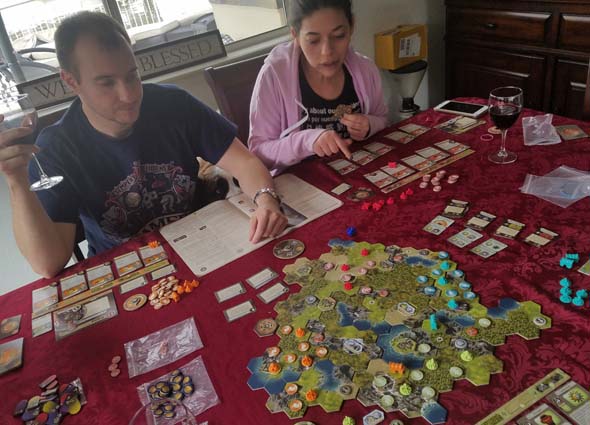
A New Dawn is a very elegant game.
A New Dawn addresses that problem by having each player take only a single action in each of their turns. There are no phases; just take an action from your focus bar and then move on to the next player. Turns, therefore, are very quick, turnaround time is very short, and the game moves along at a rapid pace. This, ironically, serves to better maintain the "one more turn" addictive nature of the computer game. You might find yourself neglecting bathroom breaks for several turns because things are moving along so swiftly. Your turn is generally quick enough that you want to finish it before you step away or take a break, and other players' turns are so quick that you don't want to step away because you know it'll be back around to your turn in a few minutes.
Longer games with longer turns and more downtime can also often result in players outright forgetting what they were planning on doing by the time the turn gets back around to them. Either that, or the large amounts of moves and actions that the other players take changes the game state so much that, when your turn comes around, the thing you were planning on doing is no longer ideal -- if it's even possible.
That's rarely a problem in A New Dawn because each player does one thing on their turn, so the state of the board isn't radically changing between your turns. It's much more of a gradual change. That doesn't mean that other players can't disrupt your plans; they certainly can, especially when combat between players starts happening. It just means that you aren't going to be sitting there bouncing up and down in your chair waiting to pull off a spectacular move, only to have another player blow up all your plans at the last minute and leave you spending far too long wondering "What the heck do I do now?" when your turn starts... [More]
67fd088c-265a-4a60-939d-4c4027df3179|0|.0
Tags:Sid Meier's Civilization, Sid Meier's Civilization: A New Dawn, Sid Meier's Civilization the Board Game, Fantasy Flight, Firaxis, 2K Games, board game, strategy, empire-building, focus bar, cities, world wonder, technology, culture, war, barbarians, James Kniffen

When Civilization V first launched back in 2010, it was in a pretty ugly, incomplete state. The game was buggy, was very slowly-paced, was completely missing any sort of espionage mechanic, and had other gaping holes in its design. It took about six or eight months' worth of patching and updating from Firaxis before the game reached a state that I would consider "adequate". Its first expansion, Gods & Kings basically came off as a fan wishlist, as it re-added (and re-vamped) many of the features and systems that had been removed between Civ IV and Civ V (religion and espionage). That expansion also addressed a lot of core complaints with the game by dramatically improving combat balance and A.I. intelligence. The second expansion, Brave New World, almost completely re-invented the game and added a considerable amount of innovation in the form of trade routes and the new great works and artifacts systems. It also added an exceptional, robust roster of new civilizations.
Civilization VI launched with most of Brave New World's innovations still in place (though culture seems to have regressed a bit), and also added its own new innovations in city management. It felt like a much more complete game at launch than Civ V was. At the time, I was blown away by Civ VI, but as time has gone by (and I've increased the difficulty level), my enthusiasm for the game has diminished a bit.
I really enjoy the game when I play it on the King difficulty level (the "easiest" of the "hard" difficulty levels, in which A.I.s only get very slight bonuses). As soon as I up the difficulty to Emperor, I start to get frustrated, and the game becomes much less fun. The problem is that on the difficulty that I enjoy (King), the A.I. puts up very little resistance, and the game (though fun) is generally too easy. I can play the game on Emperor (I haven't experimented much on Immortal or higher in VI yet), but the stacking of the deck makes the game less enjoyable because I often feel that I'm blocked out of many early-game strategies that I want to try (such as early religion or wonders). It's all possible to accomplish, but it's prohibitively so, and the game often pushes me too far in the direction of militancy.
Doesn't address core game issues
Nope. Still no build queue...
In summary, while Civilization V's first expansion filled many of the gaping holes and addressed many of the flagrant flaws in vanilla Civ V's design, VI's first expansion mostly just stacks additional mechanics and features onto an already-complete game, while leaving many of VI's annoyances, quirks, and genuine flaws un-resolved. Let's get these complaints out of the way first.
Rise and Fall does little to address complaints with shallow unit upgrade paths. There's still generally only a single unit of a given unit class every other era.
Rise and Fall does very little to improve the combat systems in general. Units still die far too easily (in my opinion) (though this seems to be due in large part to the disparity in unit upgrade levels mentioned above), and imbalances between melee, ranged, and mounted units are still prevalent.
Rise and Fall does nothing to address complaints that I've had with the maps feeling very crowded and claustrophobic.
Civilization VI back-loads most of its culture, tourism, artifact, and great work systems into the second half of the game, and Rise and Fall does very little to make these feel like game-long engagements the way that Brave New World mostly did.
It does very little to make the late-game victory march feel less like a slog, or to make the early-game feel less rushed (especially on higher difficulties).
It does very little to address complaints with how the A.I. agendas can make them very erratic and schizophrenic. A.I.s are still far too willing to agree to joint wars against their own friends, allies, and trade partners, and joint wars in general still feel like a cheap loophole that lets warmongers bypass the casus belli system and warmonger penalties. Further, while the expansion does allow for deeper alliances with mutual benefits for the civs involved, it does not expand alliances to the point of allowing for shared or cooperative victories. So dipomacy in general still feels like a zero-sum-game with every civ acting to the exclusion of all others.
There's still no icon or indication that a unit has experience bonuses from barracks or buffs such as "Spears of Fion", or to indicate which abilities or penalties a given unit has by default.
We still can't assign military units to escort traders, nor can we see the path of any particular trader after it's started a route. And Trade routes themselves still don't generate reciprocal profit by default, meaning there's no reason to want other civs to send routes to you (other than getting a free road out of it, which isn't all that rewarding).
There's also still no build queues for cities!
Religion was overhauled in a patch last year, and religious units occupy their own layer.
Some major game upgrades have already been made available via post-release patches and DLC updates, and I'm grateful for those. New resources and wonders have trickled in since launch. One of the best improvements came in an update last year that allowed religious units to exist on their own layer, so that swarms of missionaries don't block your own units' movement in your territory. And the religious system in general was improved. So the game, overall, has improved a little bit since release. It just hasn't improved as dramatically as Civ V had improved in its first year. Though, to its credit, Civ VI didn't have as much room for obvious improvement. [More]
632a8ce2-8692-4ca9-aebc-779064580062|0|.0
Tags:Sid Meier's Civilization, Civilization IV, Civilization VI: Rise and Fall, strategy, history, dark age, golden age, loyalty, emergency, alliance, Cree, Poundmaker, Dutch, Netherlands, Wilhelmina. Georgia, Tamar, Chandragupta, India, Korea, Seondeok, Mongolia, Genghis Khan, Scottish, Robert the Bruce, Mapuche, Lautaro, Zulu, Shaka

Civilization VI's first expansion, Rise and Fall just launched this past weekend. The expansion does make some welcome enhancements to alliances that makes peaceful relations with other civs much more appealing. However, these enhancements do not address two of my most fundamental complaints with Civilization's diplomacy system in general: that it does not allow for truly cooperative victories, and that it does not really provide the player with any way to influence an A.I. civ's behavior. I've already written about ideas for cooperative victories for both Beyond Earth and for the core Civilization games, so I won't go into that again here. Instead, today's blog will focus on the second of my major hang-ups with diplomacy: that you simply cannot provide A.I. civs with any indication of what you consider friendly or hostile behavior.
Diplomacy has always been one of the major stumbling blocks of the Civilization games. Each game has certain mechanics or features that are good ideas on paper, but none of the games have ever really had a diplomacy system that really seems to work the way that it is intended, and which provides consistent behavior from the A.I.s. A.I.s are often erratic in their behavior -- both between games, and within a single game.
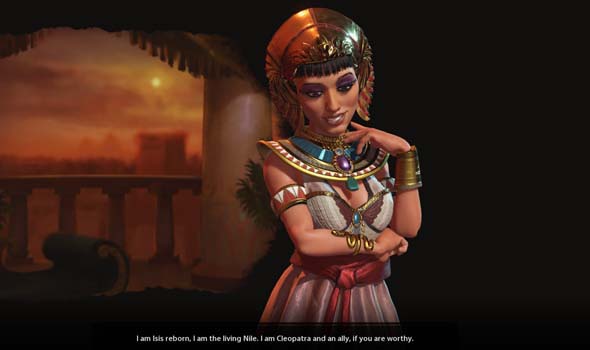
A single unit can be the difference between Cleopatra's abject disgust and her goo-goo-eyed adoration.
Civ VI introduces the agendas, which sound like a good idea on paper. It gives each leader an element of personality. They have things that they like, and things that they don't like. The problem is that these agendas lead to wild swings in an A.I.'s attitude, often based on rather trivial (and sometimes counter-intuitive) actions from the player. Often times the thresholds for activating these agendas are not entirely clear. Cleopatra tells me that my army is too weak and pathetic, and so she has a heavy negative modifier with me. Then I build a single Swordsman a couple turns later, and now suddenly my army is powerful enough to warrant her admiration, and she's looking me up and down with those goo goo eyes.
There's other legacy issues with diplomacy. The biggest one is the inability to ever warn another civ that their actions might lead to war. The denouncement mechanic of Civ V was a decent start, but since you could never provide a specific reason for your denouncements, they never seemed to have much weight in changing another civ's behavior. In a multiplayer game, you could always use the chat to inform other players' of your diplomatic desires, but there has never been any method for accomplishing this with A.I. civs in single-player.
Since the A.I. has no real clue why it is being denounced, there's no way for it to change its behavior. There's also no way for other A.I.s to understand if your denouncement or declaration of war is actually justified or not.
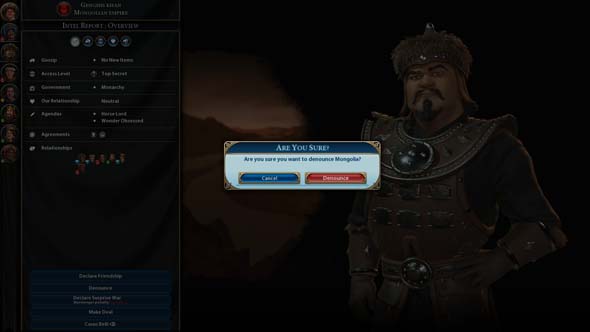
You can denounce a civ, but the A.I. won't really have any clue why they're being denounced.
Civilization VI tried to rectify this with the Casus Belli system, but that system also stumbles... [More]
892bf8a7-123e-470d-b094-32cec0a5eb7a|2|5.0
Tags:Sid Meier's Civilization, Civilization, Civilization V, Civilization VI, Civilization VI: Rise and Fall, leader, diplomacy, casus belli, friendship, agenda, denouncement, act of war, war, quest, city state, alliance, victory, AI
|

| 12 | | | | | | | 60 | | 11 | | | | | | | 55 | | 10 | | | | | | | 50 | | 09 | | | | | | | 45 | | 08 | | | | | | | 40 | | 07 | | | | | | | 35 | | 06 | | | | | | | 30 | | 05 | | | | | | | 25 | | 04 | | | | | | | 20 | | 03 | | | | | | | 15 | | 02 | | | | | | | 10 | | 01 | | | | | | | 05 |
|